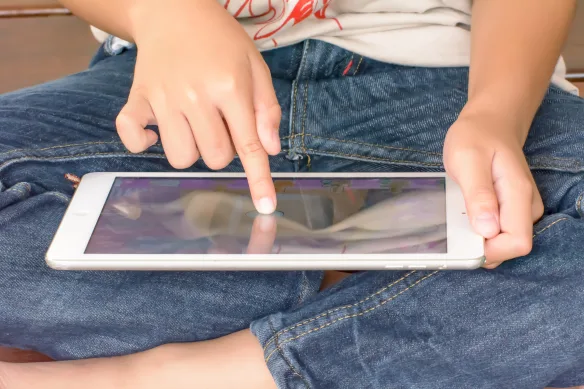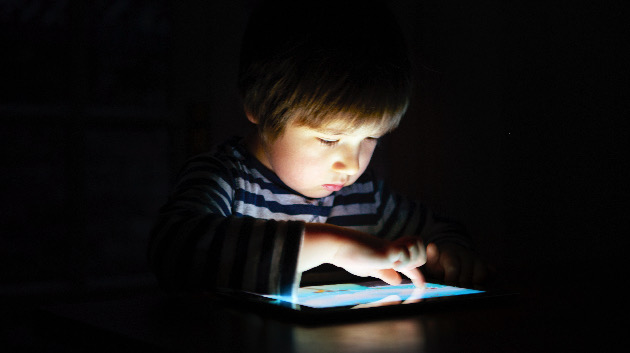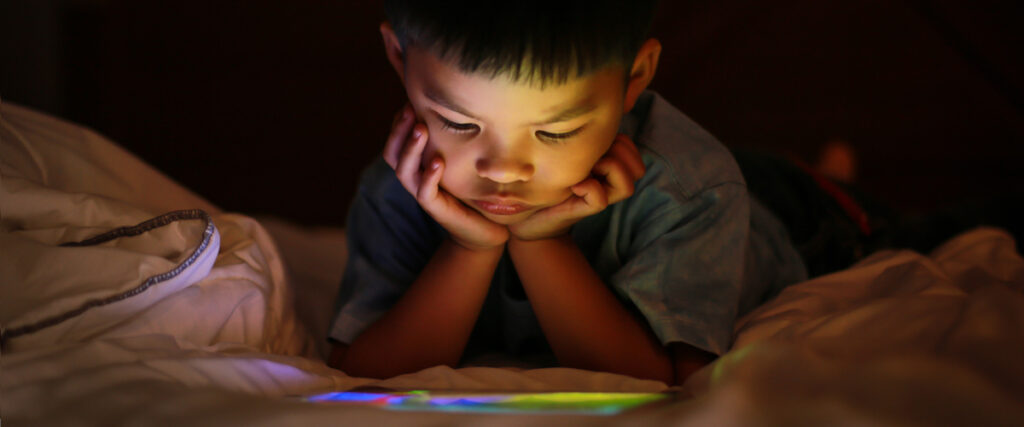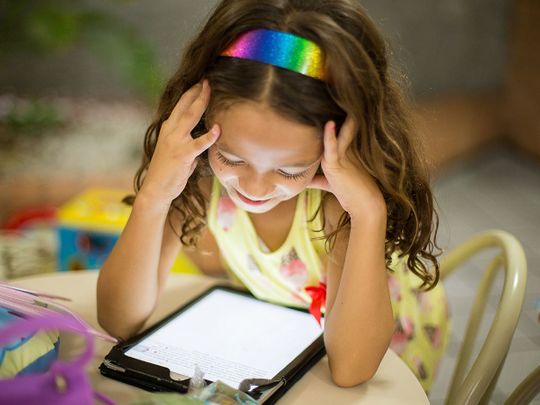Giving your infant a phone or tablet to play with may appear to be a harmless option when you’re busy, but it could have a negative impact on their development, according to a recent study.
A study of 7,097 children published Monday in the journal JAMA Pediatrics found that having one to four hours of screen time per day at age one is associated with a higher risk of developmental delays in communication, fine motor, problem-solving, and personal and social skills by age two.
“It’s a really important study because it has a very large sample size of children who’ve been followed for several years,” said Dr. Jason Nagata, associate professor of pediatrics at the University of California, San Francisco, who was not involved in the study.

“The study fills an important gap because it identifies specific developmental delays (in skills) such as communication and problem-solving associated with screen time,” Nagata said, noting that there haven’t been many previous studies that looked at this issue with several years of follow-up data.
The children and their mothers were recruited from 50 obstetric clinics and hospitals in the Miyagi and Iwate prefectures between July 2013 and March 2017 as part of the Japan-based Tohoku Medical Megabank Project Birth and Three-Generation Cohort Study.
The study tracked how many hours children spent on screens each day at age one, as well as how they performed in several developmental domains at ages two and four, including communication abilities, fine motor skills, personal and social skills, and problem-solving skills. Both metrics were based on mothers’ self-reports.

By the age of two, those who had spent up to four hours per day on screens were up to three times more likely to have developmental deficits in communication and problem-solving skills.
Those who had spent four or more hours in front of a screen were 4.78 times more likely to have poor communication abilities, 1.74 times more likely to have poor fine motor skills, and two times more likely to have poor personal and social skills by the age of two. By the age of four, the sole categories of risk remained communication and problem-solving.

“One of the areas that’s relatively understudied in the whole screen time literature is looking at the impacts of screen exposure on very young kids, especially when screens are introduced to babies,” said Dr. John Hutton, associate professor of general and community pediatrics at Cincinnati Children’s Hospital Medical Center, who wasn’t involved in the study. “It’s definitely a global concern, and I think the findings (here) should apply to, really, other countries as well.”
According to Hutton, the possible effects of screen time on communication abilities may be due to youngsters being deprived of drives for language development.
“Kids learn how to talk if they’re encouraged to talk, and very often, if they’re just watching a screen, they don’t get a chance to practice talking,” he says. “They may hear a lot of words, but they’re not practicing saying a lot of words or having that back-and-forth interaction.”
Hutton said that because real people are more multifaceted than characters on a screen, technology use might divert time away from interpersonal ties that foster social skills. When we look at people’s faces, our brains activate in order to figure out how to interact with them.
“Also, without an interactive or physical component, children are more likely to be sedentary and thus unable to practice motor skills,” Nagata added.
If children are not given enough time to play or are given a tablet to calm bad feelings, they may miss out on a critical developmental milestone: the ability to navigate discomfort.

“Longer term, one of the real goals is for kids to just be able to sit quietly in their own thoughts,” Hutton explained. “They get a little uncomfortable when they’re allowed to be a little bit bored for a second, but then they’re like, ‘OK, I want to make myself more comfortable.'” And that is how creativity occurs.”
Other elements that can influence a child’s development include heredity, unpleasant experiences such as neglect or abuse, and socioeconomic considerations, according to Nagata.
According to the most recent studies, mothers of children who spend a lot of time on screens are more likely to be younger, have never given birth before, have a lower household income, a lower education level, and suffer from postpartum depression.

There are some limitations to the study. According to experts, due to social desirability bias — wanting to say the “right” or socially acceptable thing — parents may underreport their child’s screen use while overreporting how their child is developing.
Furthermore, the authors provided little information about what children’s screen time entailed, and not all kinds are equivalent in their ability to harm or benefit, according to experts.
“Another critical question is whether the parent is watching with the child.” Hutton stated. “When a parent is watching with their child, that tends to mitigate a lot of the negatives.”

If you need to keep your toddler occupied so you can get things done or have some alone time, experts recommend giving them a book, coloring materials, or toys. They can even enjoy these activities while restrained in a highchair.
If you must use a screen, choose instructional information or video chats with a loved one so they can still get some social interaction, according to Nagata.
According to Hutton, one difficulty with some internet children’s content is that parents will believe it is educational since it is marketed as such and has a lot of information about the alphabet, colors, numbers, or animals that their children can see and hear. Content that helps youngsters apply their knowledge beyond rote memorization, however, jumpstarts learning so they can “navigate the real world, where things are more unpredictable and require more creativity and resilience,” he added.
Hutton and Nagata suggested that youngsters watch longer videos instead of short ones because watching a lot of short movies can impact their attention span and capacity to absorb what they’re watching.
Use screen time sparingly and turn off gadgets while not in use, according to Nagata. “Aimless viewing can also distract children from focusing on an activity or in-person communication.”
Experts also recommend that parents set a good example by not allowing their children to spend too much time on screens.
The American Academy of Pediatrics recommends considering screen time quality rather than quantity, but the organization does have resources for determining guidelines and limits for your family, such as its family media plan that you can tailor to your own family’s needs and advice for helping your kids develop healthy habits.
“We just need to slow down and… be as careful and mindful as we can about anchoring kids in the real world, which is really how we evolved as humans,” Hutton said. “There will be plenty of time for screen time later once we have a better understanding of who the kids are and what they require.”
Download The Radiant App To Start Watching!
Web: Watch Now
LGTV™: Download
ROKU™: Download
XBox™: Download
Samsung TV™: Download
Amazon Fire TV™: Download
Android TV™: Download

